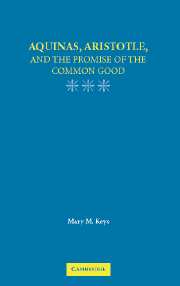Book contents
- Frontmatter
- Contents
- Acknowledgments
- PART I VIRTUE, LAW, AND THE PROBLEM OF THE COMMON GOOD
- PART II AQUINAS'S SOCIAL AND CIVIC FOUNDATIONS
- 3 Unearthing and Appropriating Aristotle's Foundations: From Three Anglo-American Theorists Back to Thomas Aquinas
- 4 Reinforcing the Foundations: Aquinas on the Problem of Political Virtue and Regime-Centered Political Science
- 5 Finishing the Foundations and Beginning to Build: Aquinas on Human Action and Excellence as Social, Civic, and Religious
- PART III MORAL VIRTUES AT THE NEXUS OF PERSONAL AND COMMON GOODS
- PART IV POLITICS, HUMAN LAW, AND TRANSPOLITICAL VIRTUE
- Works Cited
- Index
4 - Reinforcing the Foundations: Aquinas on the Problem of Political Virtue and Regime-Centered Political Science
Published online by Cambridge University Press: 25 July 2009
- Frontmatter
- Contents
- Acknowledgments
- PART I VIRTUE, LAW, AND THE PROBLEM OF THE COMMON GOOD
- PART II AQUINAS'S SOCIAL AND CIVIC FOUNDATIONS
- 3 Unearthing and Appropriating Aristotle's Foundations: From Three Anglo-American Theorists Back to Thomas Aquinas
- 4 Reinforcing the Foundations: Aquinas on the Problem of Political Virtue and Regime-Centered Political Science
- 5 Finishing the Foundations and Beginning to Build: Aquinas on Human Action and Excellence as Social, Civic, and Religious
- PART III MORAL VIRTUES AT THE NEXUS OF PERSONAL AND COMMON GOODS
- PART IV POLITICS, HUMAN LAW, AND TRANSPOLITICAL VIRTUE
- Works Cited
- Index
Summary
In the previous chapter we saw Aquinas unearth in his Commentary and appropriate in his ST Aristotle's first political-philosophic foundation in Politics I: the relative yet real naturalness of civic life for human beings, and the close link between this naturalness and that proper to the virtues, about which more will be said in the last part of this chapter. In this chapter I explore another political-philosophic foundation common to both Aristotle and Aquinas, and from that vantage point begin to question the absolute affinity between Aquinas's and Aristotle's foundations for political theory. My analysis focuses first on Aquinas's more ambivalent response to Aristotle's second civic foundation in the distinct natures and requisites of political regimes and their corresponding versions of political virtue. I argue that as a consequence of finding faults in Aristotle's second foundation, Aquinas defers or declines to comment on Aristotle's science of the absolutely best regime – the Philosopher's third political-philosophic foundation in Politics VII and VIII. Instead, Aquinas sets out to reinforce an Aristotelian grounding for politics with a new ethical foundation of his own: his theory of natural law and the human inclination toward moral virtue.
The argument of this chapter commences with what I have termed Aristotle's second foundation: the centrality of regime particularity, citizenship, and civic virtue to politics and political science, as elaborated in Book III of the Politics and the corresponding sections of Aquinas's Commentary.
- Type
- Chapter
- Information
- Aquinas, Aristotle, and the Promise of the Common Good , pp. 87 - 115Publisher: Cambridge University PressPrint publication year: 2006



